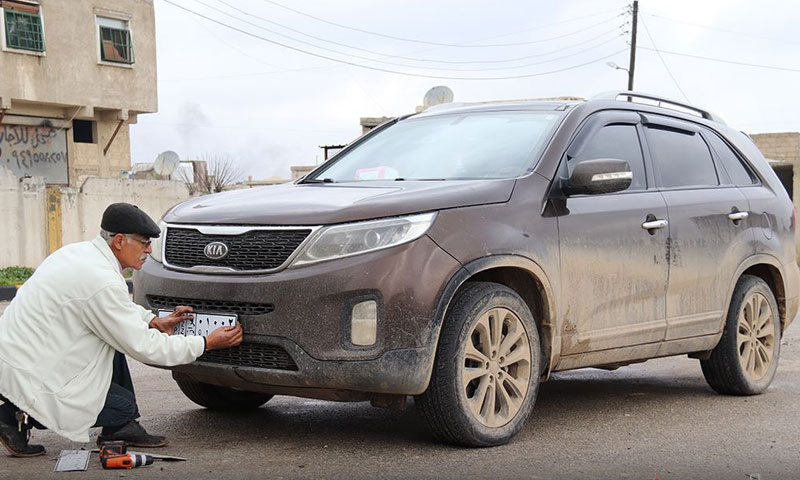



Aleppo countryside – Asim Melhem
A year and a half has elapsed since the first procedures for regulating cars’ registration by local councils in the countryside of Aleppo, when al-Bab local council launched a project to license vehicles and install registration plates. Later, in early March 2018, the Azaz local council followed the lead by activating the Transport Department in the city and starting to register cars and heavy vehicles and give it full licensing.
Vehicles’ owners in al-Bab have complied with the procedures of licensing and installation of registration plates since its issuance, while the campaign continues to include the rest of the vehicles, which pushed a segment of the city’s residents to express their disappointment with the results of the application of the new procedures.
According to what has been published on al-Bab police forces facebook page, the vehicle registration campaign aims to protect civilian vehicles from stealing and prevent the entry of bicycles and car bombs to preserve the security of the area.
In a previous interview with Enab Baladi, the head of al-Bab local council, Jamal Othman, said that the project of registering cars in the city is designated to preserve private properties, within the framework of maintaining stability in the region and restoring the civil aspect of life.
Enab Baladi has previously learned from a source in the Transport Department in al-Bab city, who spoke on condition of anonymity, that the registration of cars depends on the new identity card issued for the concerned citizen, provided that the data related to one network in all the cities and regions of the Euphrates Shield (managed by Turkish states). The source explained that the registration system is connected with Azaz, Qabasin, and Jarabulus; to reach al-Bab city in the eastern countryside.
The process of installing registration plates takes place on different stages. In the beginning, the car is inspected, then the vehicle’s data are documented; namely, the chassis number, the number of seats and the driver’s identity. This procedure applies to all types of cars, whether regular private or European.
Following the detection process, which is accompanied by documenting, scanning and integrating the vehicle’s information in the database, the Transport Department issues a driver’s license for the owner and a car record containing all the data, confirmed with the head of the department’s stamp.
Once the procedures are completed, the registration plate is to be installed, in addition to taking a picture of the vehicle and its driver, which will be kept by Transport Department and the Civil Registration Department.
Registration procedures are carried out in the Transport Department in al-Bab city, where the Council sets a 50 Turkish Liras fee for motorcycle registration and from 100 to 300 Turkish Liras for car registration.
On 16 December, the traffic police in al-Bab city renewed their demand for the registration of vehicles and bicycles, while warning that they would seize every unregistered vehicle.
Some car owners protested the value of the fees required by the local council and the city traffic police to register their vehicles. Thus, Majd al-Hussami, owner of a used motorcycle, stated, while talking to Enab Baladi, that he cannot afford to pay the registration cost, estimated at 10.000 Syrian pounds, especially under the difficult living conditions the Syrian people are enduring.
The vehicle registration campaign in the city of Al-Bab affected the movement of buying and selling cars negatively, as most people are unwilling to buy registered bikes, due to the restriction imposed by the local council on matters of ownership confirmation and high costs, as Mohammed al-Babi, a car dealer in al-Bab city, puts it.
On the other hand, most bike owners have recently started registering their vehicles, after the traffic police set a deadline, before starting to seize unregistered bicycles.
According to Enab Baladi, a large number of motorcycle owners got registration plates for their motorcycles, hoping to reduce thefts and seizing explosives in the area. However, the situation did not change and remained the same, according to Mohamed al-Jaber, the owner of a motorcycle in al-Bab city.
Abdel Karim Suleiman, a motorcycle owner, told Enab Baladi: “I registered my motorcycle, because I expected that other measures to facilitate traffic and improve roads will be implemented, in addition to ending thefts, however, the situation is heading for the worst.”
With the citizens’ frustration and doubt regarding the feasibility of the registration campaign, Enab Baladi tried to obtain a response from the head of the traffic police department in al-Bab city, Major Haythem al-Shihabi, about people’s opinions on the issue. However, he refused to comment, contenting with what the police have previously announced regarding the significance of the campaign in maintaining security and protecting the private properties.
if you think the article contain wrong information or you have additional details Send Correction